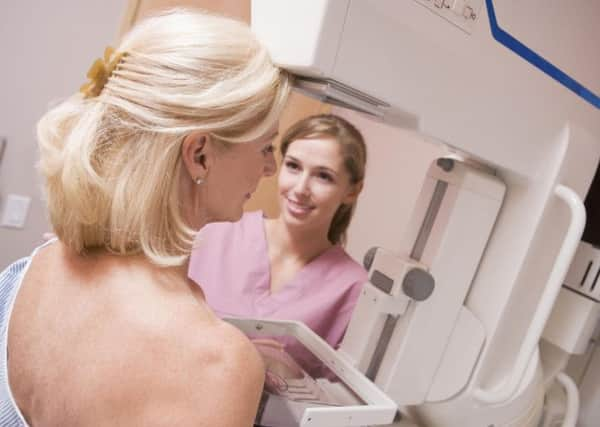Hospital urges be breast aware


Every year nearly 55,000 people are diagnosed with the disease in the UK, that’s the equivalent of one person every 10 minutes. Although the majority are successfully treated, nearly 12,000 people die from it every year.
October is breast cancer awareness month and people are being invited to pop along to the Macmillan information centres at Scunthorpe General Hospital and Grimsby’s Diana, Princess of Wales hospital to find out more about the disease.
Advertisement
Hide AdAdvertisement
Hide AdBreast consultant Miss Jenny Smith said: “The majority of breast cancers are first spotted by the woman herself or her partner. This shows how important it is to be breast aware and to know what is normal for your breast, so you can spot any changes as soon as possible. Early detection is key to treating the disease. I suggest self-examination of the breast and armpit areas approximately once a month away from the time of your period.
“Age is possibly the biggest single risk factor in breast cancer, women over 50 are particularly at risk. It’s by no means unheard of for women under this age to have breast cancer but it is less likely. Other risk factors can include a family history of the disease, previous cancer or taking hormone replacement therapy beyond the age of a natural menopause.
“The good news is that nine times out of 10 changes in the breast aren’t cancerous. In fact, many women have naturally ‘lumpy’ breasts, caused by other harmless conditions such as cysts. However, it’s always best to check any lumps or changes in your breasts with your doctor sooner rather than later.
“You can reduce your risk of developing breast cancer by maintaining a healthy body weight, exercising regularly and keeping alcohol intake to moderate levels or less.”
Symptoms to look out for:
Advertisement
Hide AdAdvertisement
Hide Ad· A rapid change in the size of shape of your breasts
· Redness or a rash on the skin and/or around the nipple
· Discharge (liquid) that comes from the nipple without squeezing
· A swelling in your armpit or around your collarbone
Advertisement
Hide AdAdvertisement
Hide Ad· A lump or thickening that feels different from the rest of your breast tissue
· A change in skin texture such as puckering or dimpling (like orange skin)
· Your nipple becoming inverted (pulled in) or changing its position or shape
· Constant pain in your breast or your armpit.
Please consult your GP if you are concerned.
Did you know:
· One in eight women in the UK will develop breast cancer in their lifetime
Advertisement
Hide AdAdvertisement
Hide Ad· Breast cancer is the second most common cause of death from cancer in women in the UK
· Breast cancer also affects men with around 400 being diagnosed each year
· More than eight out of 10 (85 per cent) of people survive breast cancer beyond five years.
At Scunthorpe hospital people will be able to pop along to a display in the restaurant on Monday October 6 and Monday October 20 between 10am and 2pm. It will be manned by a team of trained Macmillan volunteers. There will also be lots of information to hand in the Macmillan information centre which is manned by a team of trained Macmillan volunteers.
Advertisement
Hide AdAdvertisement
Hide AdAt Grimsby hospital people will be able to drop-in at the Macmillan information centre, as well as a stall which will be manned in the main concourse on Friday October 3.
Samantha Woolliss, Macmillan information facilitator, said: “The Macmillan information centres at the hospitals provide free information and support services for anyone affected by cancer, whether you have cancer yourself, care for a friend or relative, work as a health care professional or simply want to know more about cancer.”
Trained volunteers are on hand to guide people through information materials and websites focusing on cancer and other health-related issues, or just signpost people to relevant information.
Samantha said: “People do not need to make an appointment and can simply drop in. The centres are open Monday to Friday 9.30am to 4pm. As well as offering information and emotional support, we can provide welfare and benefits advice as well.”